Russia’s full-blown invasion of Ukraine has been ongoing for one and a half years. It has taken hundreds of thousands of lives, wiped entire cities off the face of the earth, and scarred several generations of Ukrainians to come.
It is only possible thanks to the Kerch bridge, constructed with the help of Dutch companies that violated EU sanctions. Each day, Russia’s rail-reliant forces in southern Ukraine get their dose of ammunition, equipment, and fuel through this military lifeline connecting occupied Crimea with mainland Russia.
Destroying the bridge would change the situation “180° in Ukraine’s favor,” and thus Ukraine has attacked it two times, but the bridge still stands. Yet the Dutch companies that helped build this crucial infrastructure element enabling Russia’s full-scale war got off with a slap on the wrist.
Euromaidan Press talked with Heleen over de Linden, a Dutch lawyer working with sanction violation cases, to understand how this happened and what it means for the future of sanctions.
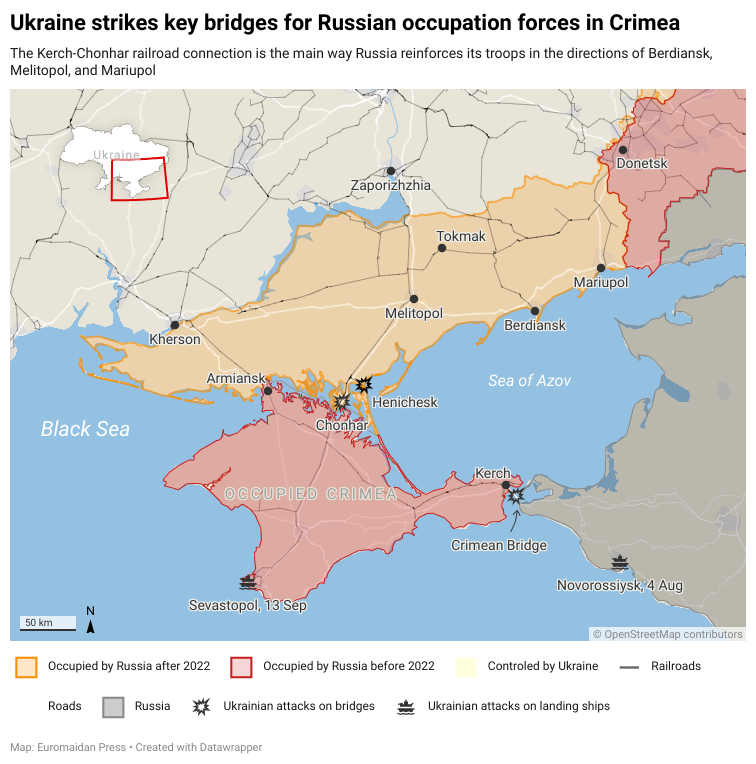
Could you please explain what happened with the companies that helped build the bridge?

The case has been pending since 2017. It took much longer than expected because it was very difficult for our prosecutor to find the evidence; I expected no decision would be made at all, as normally, after two years, our prosecutors decide that the person suffered already too much, and the case is annulated or closed. However, here they continued; decisions have been made for four companies and eight persons, but these are not court decisions; they made settlement agreements with these persons.
Therefore, lawyers and journalists do not have inside information about what was agreed and with which companies. But nevertheless, we managed to obtain the following details:
- Four companies have to pay penalties of €4,000-100,000 per company; €160,000 in total; additionally, one company has to pay an extra €71,000 of turnover profit;
- Eight persons received 20-60 hours of community service;
- Separately, three companies had not signed a settlement agreement with the Dutch prosecutor and will wait until the court decides on their cases.
We know the names of two companies involved: Dematec Equipment
and
Bijlard Hydrauliek. Another company, Enerpac Heavylifting, will wait until the court decides.
We don’t know all the details, but for Dutch standards, these are very low penalties, basically nothing. They are, of course, very in favor of the persons and below our expectations of a punishment that a person has to serve after such a crime.
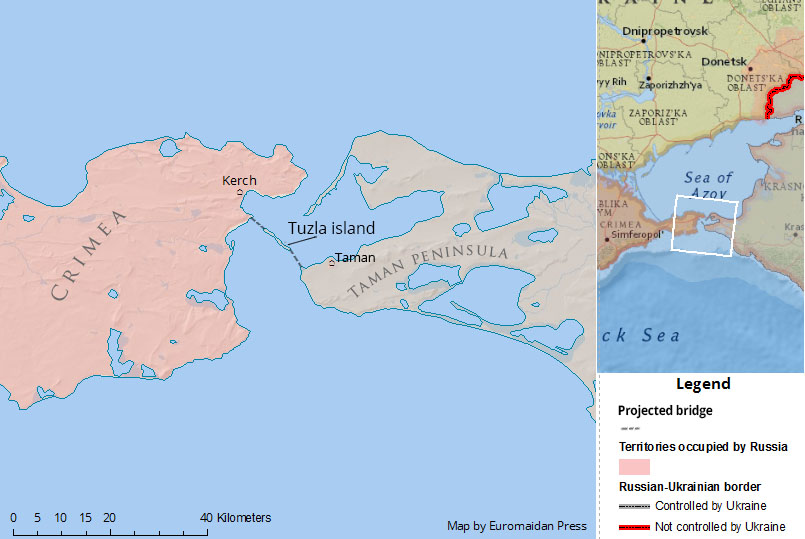
No newspaper has mentioned the names of the other companies, but we do know that the investigation found that AkzoNobel and Mammoet were not working at the Crimea Bridge. AkzoNobel explained that they made an offer or some experiments with paint coatings for possible work on the projects, but never started actual work with the construction company.
So, the punishment is very mild, yet the damage that has been done to Ukraine is enormous. Is this the punishment that is envisioned by law?
This case was pending for six years, or even seven, as newspapers had started to write about this even earlier, meaning there were problems. Six years is a very long time in the Netherlands to be under suspicion. This is the only reason for the very mild convictions.
There are now other sanctioned cases under review, with the first of them coming to a court decision was last week.
It is of a person named Dimitri, who is originally from Russia, lived in the Netherlands, and exported last year a huge amount of microchips to Russia. He was in jail for several weeks, and after the court allowed him to go home, he returned to Russia.
Last week, a court ruled that he is mandated to pay a fine of €350,000 and serve a three-year prison sentence. That's already a more serious conviction.
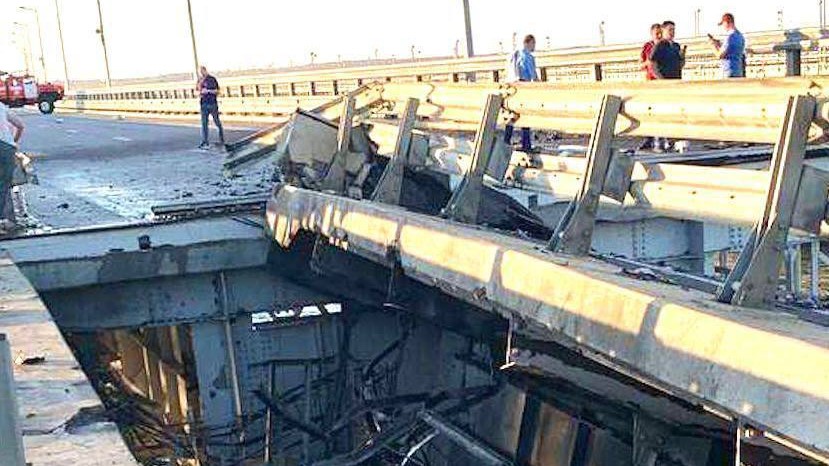
Photo via subscribers of the Russian Telegram Channel Baza.
Additionally, our legal framework stipulates that prison sentences can extend up to six years, coupled with fines reaching as much as €900,000. These are indeed substantial and severe penalties.
In the ideal world, if the proof for the construction of the bridge from these companies was acquired quickly, what penalties should have been incurred?
Probably very huge penalties, because in the Netherlands everybody is convinced that it is really a serious crime, and it is terrible that it happened, because we don't know which time it could have taken Russia to build a bridge, if the Netherlands had not helped so much.
If it was processed quickly, probably maybe up to three years in prison and and huge penalties from €100,000, but also depending on their earnings, profits, and how long they were involved, etc.
It seems like the penalties are being paid to the state of the Netherlands, but the damage has been done to Ukraine. Does the existing system actually allow compensating Ukraine for the damages that have occurred?
That's a great question.
We have discussed this issue during all the 11 new sanction packages that came into force last year. This question has been asked about the asset freezes [the West has frozen approximately $300 bn of Russian assets but no decision has made on using them in Ukraine’s favor – ed.], and proposals to confiscate and send the money to Ukraine have been made, but that's still difficult, because in our law, when you are owner of a property or a bank account, it's not possible just without conviction to confiscate money and send it to Ukraine.
Right now, with these penalties for the Crimean bridge construction, nobody has been asking how the penalties could be used to help Ukraine, and that’s a shame. It has to be done, because clearly Ukraine has to be helped with this terrible situation. However, I have not heard discussions about this topic, likely because we had no convictions regarding sanctions cases, apart from this Crimean bridge case.
But if you are going to prosecute everybody now who is infringing the regulations, still exporting to Russia by sanctions evasion via Kazakhstan or Turkmenistan, we have to take these people to justice, and we can take their profit and their penalty. But I don't remember that our government had taken any initiative to work on this. So that's a good question.

Is it my understanding that all of the sanctions legislature is of this type, that the penalties do not go to the victim state?
Yes. And regarding the frozen assets, the money is still here, it is even not managed because our legislation was not ready for management of frozen assets. It is pending and nobody has done anything. I recently had a huge case, when the property of Mr. Volozh, a Russian oligarch, was frozen in Amsterdam city center. Squatters who entered that building and are living there asked me to defend their case in court. I told the journalists: “It’s good for the squatters, that they won the case with me. But on the other hand, nothing is done for Ukraine. This is a huge building. Instead of squatting it, we could have given it to people who will pay a huge rent. And the rent will go to Ukraine.”
But nothing has been done, still not one single euro has gone to Ukraine.
Because I had done a lot of research on Yanukovych [former Ukrainian president, who escaped to Russia in 2014] and his allies. They had billions of euros in the Netherlands in bank accounts, which are frozen. I and our parliamentarians asked the government to provide information about the amount of assets frozen, and when it will be repatriated to Ukraine, as that was in essence the idea.
There has never been an answer; our government said the information about how many assets of which persons are frozen is confidential, stipulated in legislation about privacy. I believe even the frozen assets of Yanukovych and his alias didn't went to Ukraine.
What is the state of the discussion about the use of Russian frozen assets to help Ukraine in the Netherlands now?
There have been many discussions. [EU Commissioner President] Ursula von der Leyen provided us with a new regulation, but it still hasn’t come into force. And now the discussion is more or less that we don't know what to do.
So now we have an example in Belgium, where there are so many assets frozen as bank accounts at Euroclear. Now the Belgian government wants to send to Ukraine the taxes paid on the profits of these frozen assets. But this option does not work for us, as Netherlands does not have such a large amount of frozen assets. And there are the property rights and rules that you can’t infringe them. Now, since there is the war in Israel with Hamas, we are not talking about any more about sanctions or what to do with Ukraine.
How Dutch companies evaded sanctions to help Russia build the Crimea (Kerch) Bridge
The Crimean Bridge, opened by Russia in May 2018, connected Crimea to the Russian mainland across the Kerch Strait. Its construction was a major feat of engineering that relied on the participation of foreign companies, including seven Dutch firms that were under investigation by the Dutch Ministry of Justice.
The involvement of the Dutch companies was initially kept secret, as Russian authorities claimed only Russian entities worked on the bridge. However, according to the Dutch online newspaper De Gelderlander, the companies used various methods to circumvent sanctions and deliver equipment to the project.
Dematec Equipment
provided a hydraulic hammer, delivering it to Russia in early 2016 where it was assembled on Russian territory. The company's director stated that sanctions were not violated because they prohibit work in Crimea, but not in Russia. However, EU regulations also prohibit circumventing bans.
Bijlard Hydrauliek transferred a key component of a hammer to an intermediary company in the Netherlands. Its director did not believe the sanctions applied if the work was not in Crimea itself, claiming, "We just sold the products to a Dutch customer. That's all."
Enerpac Heavylifting admitted it delivered equipment to a Russian company without knowing it would be used for the bridge. After an internal investigation, its parent company in the US fired the Enerpac office head.
Dieseko supplied vibrating hammers and hydraulic systems to a Russian customer through a Finnish distributor, stopping work with the customer after it was sanctioned by the US.
Allpacks International also supplied an innovative vibrating hammer seen in photos from the construction site soon after its 2016 product launch. Allpacks went bankrupt in 2018 amidst the investigation.
Cape Holland and IHC International reportedly admitted supplying pile driving equipment used for the bridge project.
The justifications given by the companies center around claims they did not know the final destination thanks to intermediaries, and that work outside Crimea does not violate sanctions. However, EU regulations prohibit participating in activities circumventing bans. Proving companies' intentions requires examining internal communications, which authorities often lack access to.
Dutch lawyer Heleen over de Linden, who assisted the investigation, said companies removed branding from equipment to conceal involvement. She believes fines for circumventing sanctions are too low, so violations continue. However, gathering primary evidence is key for prosecution, which in this case was hard to get.
Siemens supplying turbines to Crimea: another case of egregious violation
EU sanctions prohibit a range of activities like investing in Crimean real estate or infrastructure projects, restrict trade and investment in Russia's transport, telecommunications, and energy sectors.
Despite the sanctions, some Western firms found ways to continue operating in Crimea and exploit loopholes to serve the Russian regime.
One major sanctions violation case involves German company Siemens supplying gas turbines to occupied Crimea in 2017. The turbines were officially sold to a power plant in Russia, but ended up in Crimea.
An investigation by Euromaidan Press found Siemens had reason to know where the turbines were actually going based on details like the confidential contract, the partner company's ties to Crimea projects, and the turbine specifications matching Crimean power plants specifically.
Yet Siemens maintained its Russian partner violated their contract prohibiting Crimea as the destination. Siemens even filed a fruitless lawsuit trying to get the turbines returned.
The German prosecutor's office declined to prosecute Siemens, citing the contract clause. But the EU sanctioned three more Russian officials and companies over the turbine transfer.
The Siemens case illustrates how complex corporate structures and arguments about indirect deliveries enable sanctions evasion. Despite apparent evidence suggesting Siemens intentionally skirted bans by selling to a Russian intermediary, the sanctions loopholes and lack of hard proof led authorities to turn a blind eye.
Read more in Euromaidan Press editor-in-chief Alya Shandra's report: Crimean Sanctions: violations, monitoring, and enforcement
Related:
- How Putin’s Crimean bridge grew over 2016-2017 – satellite images
- Scandal as Dutch companies help build bridge to occupied Crimea, violating sanctions
- The $ 300 billion question: Why the West does not confiscate Russian frozen assets despite Ukraine war
- Reuters: Dutch prosecutor fines four companies for helping Moscow build Crimean bridge
- How Siemens chose to ignore the obvious. An investigation into the Crimean sanctions break

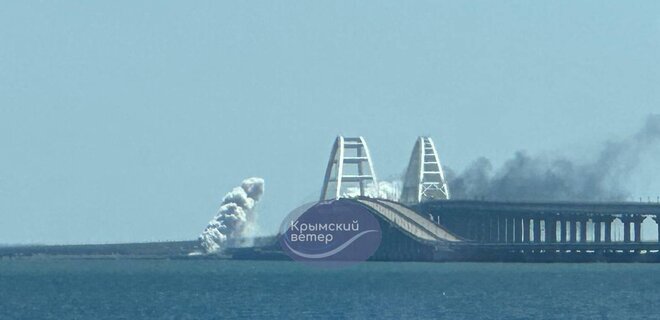

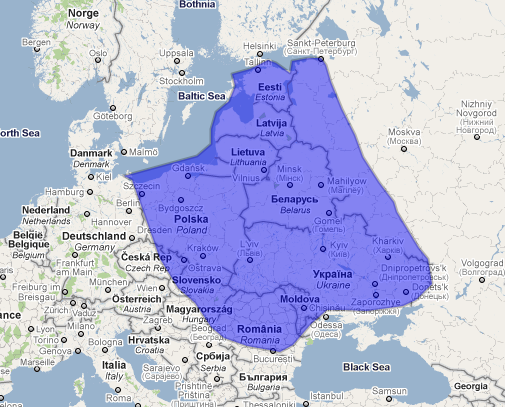
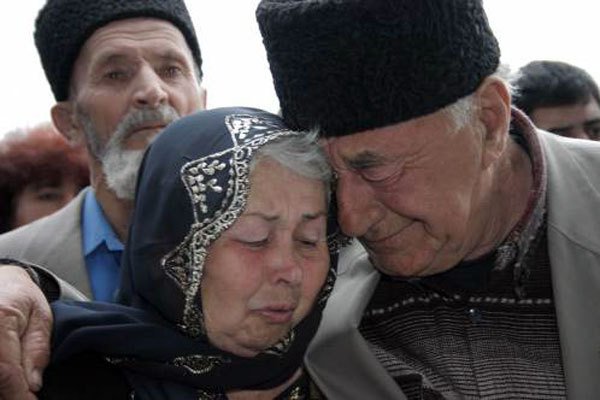
![One of five new boundary markers along the border between China and Russia in Northeast China's Jilin province. [Image: Weibo]](https://euromaidanpress.com/wp-content/uploads/2015/11/d8cb8a51464717a54d62011.jpg)